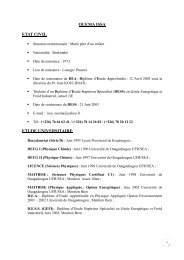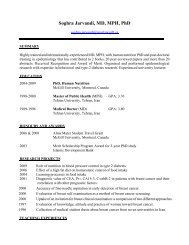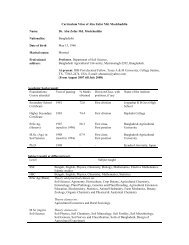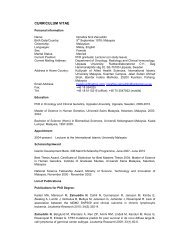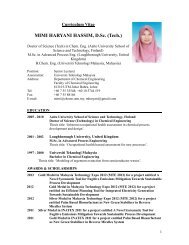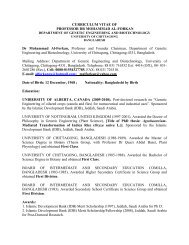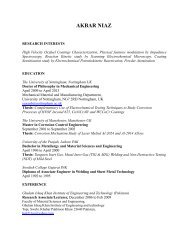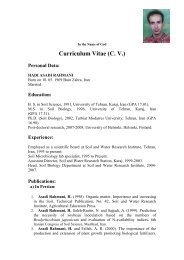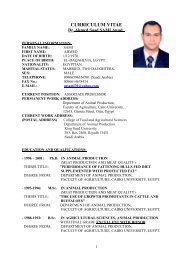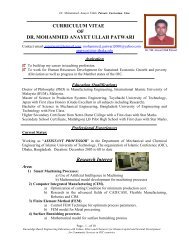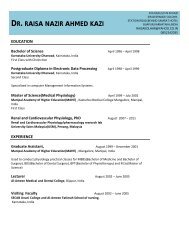Engineering: issues, challenges and opportunities for development ...
Engineering: issues, challenges and opportunities for development ...
Engineering: issues, challenges and opportunities for development ...
Create successful ePaper yourself
Turn your PDF publications into a flip-book with our unique Google optimized e-Paper software.
AN OVERVIEW OF ENGINEERING‘professional’ ethics) that is broad enough to encompass manytypes of ethical problems encountered at work by engineers,whether they are considered as ‘true’ professionals or not.Some American scholars consider that engineering ethics relyon the fact that the engineering community has adopted st<strong>and</strong>ardsdefining what is morally permissible, which are specific toits members <strong>and</strong> go beyond the requirement of law, market<strong>and</strong> ordinary morality. They consider engineering ethics as akind of practical wisdom in the professional practice, whichcan <strong>and</strong> must be transmitted. This is an interesting approachbut it relies on the adoption of such st<strong>and</strong>ards, which is notthe case all over the world. Moreover, where codes of ethicsdo exist, these codes often suffer from a lack of legitimacy <strong>and</strong>rein<strong>for</strong>cement procedures.Following this approach, engineering ethics would not be somuch about promoting respect of professional obligations.The focal point of engineering ethics would not be a status (aprofession). Neither would it be knowledge (engineering sciences).<strong>Engineering</strong> ethics is not an ethical reflection on technicalobjects; it is the ‘ ethics of techniques’. Neither is the roleof engineering ethics to evaluate technical decisions (this hasbeen the aim of a field called ‘Technology Assessment’ sincethe 1980s). The focal point of engineering ethics is an activity.Moreover, in our engineered world, engineering ethics cannotbe a preoccupation reserved <strong>for</strong> engineers only, but <strong>for</strong> allcitizens concerned by the impact of engineering decisions. Theexpression ‘engineering ethic’ reminds us of the human originof the technologies. It explicitly refers to a type of work <strong>and</strong> toa human community more in charge of this work than others:the engineers.What is engineering?Until recently, human social sciences <strong>and</strong> philosophyshowed little interest <strong>for</strong> engineers <strong>and</strong> their practice. In theUnited States, the independence of the subject ‘the historyof technology’ from ‘the history of science’ is very recent.Even more recently, we can mention the ef<strong>for</strong>t of Gary LeeDowney <strong>and</strong> Juan Lucena to attempt to trace the outlines of aspecific field <strong>for</strong> engineering studies. Several characteristics ofengineering are described in academic literature. Some insiston the dual nature – scientific <strong>and</strong> economic – of engineering;engineers are scientists but also business people because thetesting of their work does not occur in laboratories but onthe market place. Others underline the social dimension ofthis practice, which is a combination of labour <strong>and</strong> capital.The knowledge of engineers has something to do withscientific knowledge, but it remains different. Mike Martin<strong>and</strong> Rol<strong>and</strong> Schinzinger have defined engineering as ‘socialexperimentation’. Carl Mitcham insists on the fact that theproduct of engineering is not knowledge, but ‘an object whichtrans<strong>for</strong>ms the world’.What then are the main characteristics of engineering? Firstly,engineering takes place in a complex work environment. Theagents of technical acts are engineers, but also technicians, nontechnicalexecutives <strong>and</strong> sometimes administrative <strong>and</strong> politicaldecision-makers. Secondly, the act of engineering has the abilityto trans<strong>for</strong>m the real world <strong>and</strong> produce consequences, whichare sometimes irreversible <strong>and</strong> partially unknown. <strong>Engineering</strong>is characterized by the potential power <strong>and</strong> the partial uncertaintyof its impacts, both present <strong>and</strong> future, on the natural<strong>and</strong> human environment. Finally, engineering is characterizedby a central act: the act of designing. This act is a process bywhich objectives or functions take shape in the imagination of<strong>and</strong> plans <strong>for</strong> the creation of an object, a system or a service,with an aim to achieve the goal or function.What about engineers‘ responsibility?The moral obligations of engineers arise from the dependenceof the whole of society on engineers, <strong>for</strong> certain things at least,such as the acts of technical design. Engineers have a greatresponsibility because if they fail to do their job with technicalcompetency <strong>and</strong> commitment to ethics, not only can anindividual be harmed or killed (as is the case if a doctor failsto do his/her job), but dozens, hundreds, even thous<strong>and</strong>s ofindividuals may be affected.Although the principle of proportionate care obviously <strong>for</strong>msthe basis of the engineers’ moral responsibility, we must keep inmind one difficulty: the phenomenon of dilution of individualresponsibility in large corporations that may favor impunity. Onthe other h<strong>and</strong>, it may be unjust to have an individual agentbear the responsibility of the unwanted harm due to a structuralfailure of a collectivity. The line seems to be narrow betweenmaking the individual engineers excessively responsible <strong>and</strong> theabdication of any responsibility as a subterfuge <strong>for</strong> inaction.In the shift from the activity to the actors, from the ethical<strong>challenges</strong> of engineering to the moral responsibility of theengineers, three questions need to be addressed: What is themoral legitimacy of engineers when taking into account theethical <strong>issues</strong> of engineering in their decisions <strong>and</strong> actions?What is the specific knowledge that they have access to? Whatis their specific freedom of action within the organizations inwhich they are employed?LegitimacyFor some authors, the ethical questions raised by technical<strong>development</strong> do not really concern the engineers because ofits highly political dimension. Some authors are very scepticalregarding the obligations of engineers in the American codesof ethics that seek to protect the public against the bad effectsof technical <strong>development</strong>s. Thus, engineers can express theirpoint of view, with a full legitimacy, in the debates about thetechnical choices at different levels: within their companies,with peers <strong>and</strong> other colleagues but also with staff representa-185



